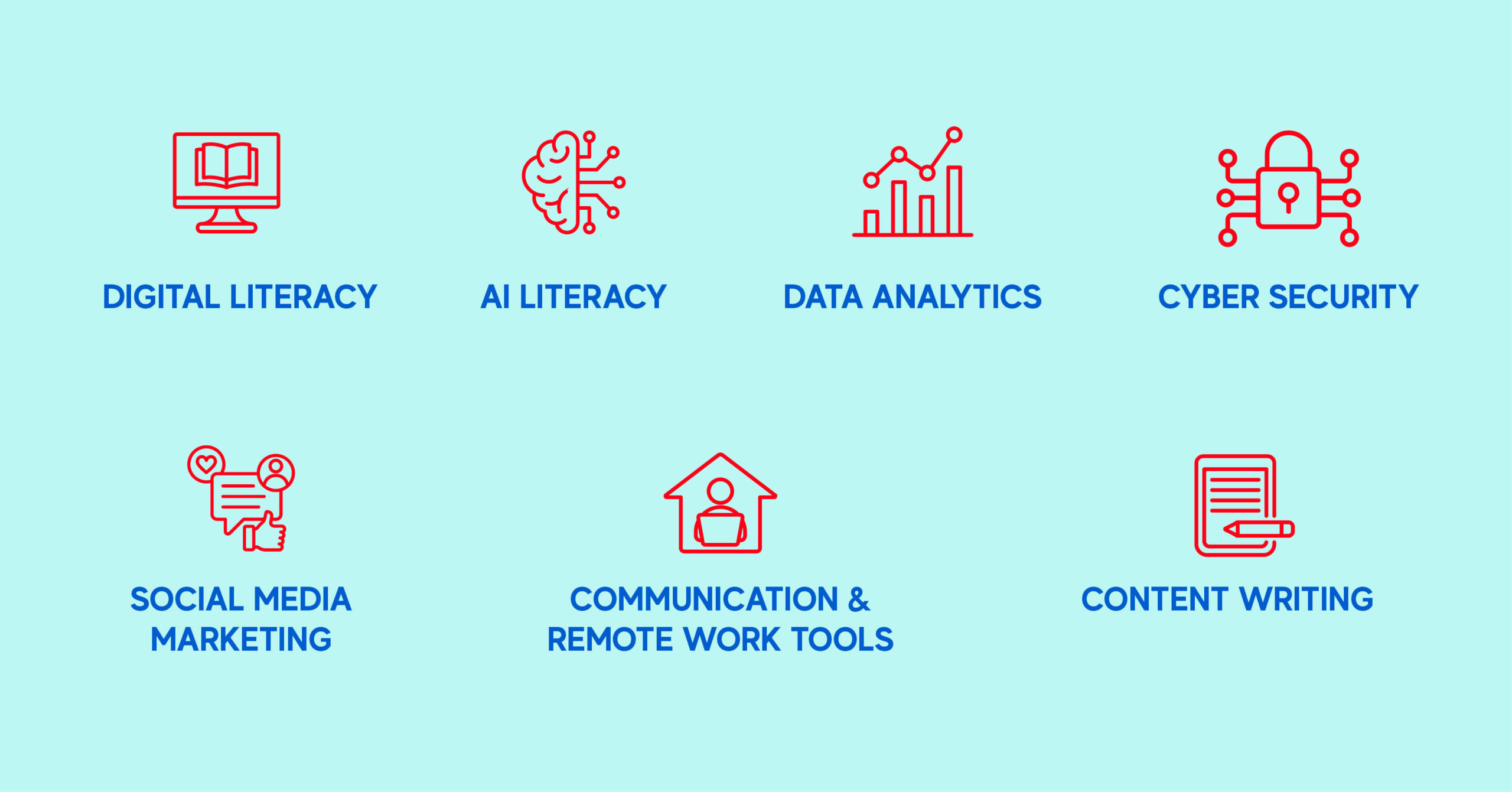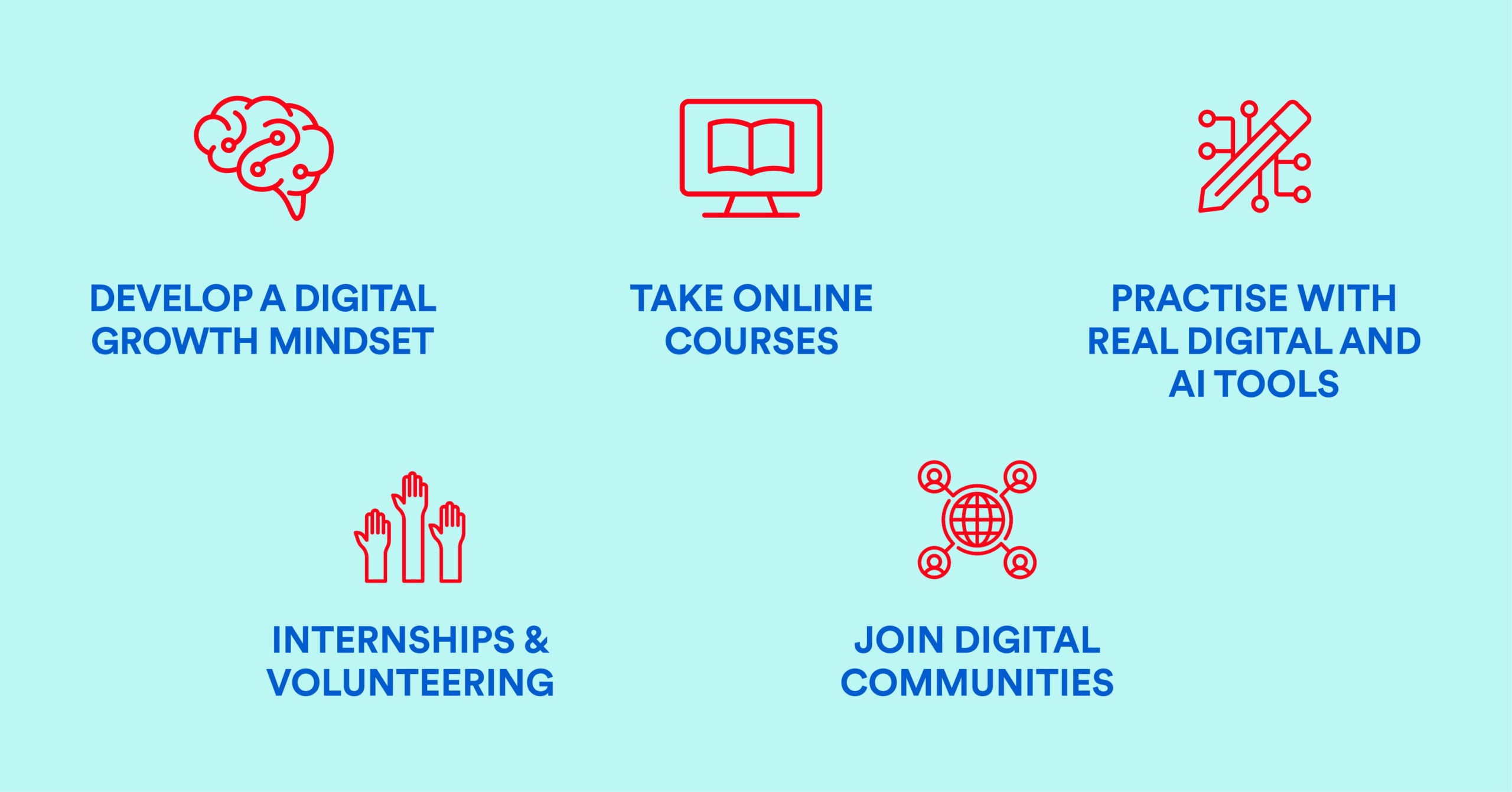
At university, you are learning the knowledge and skills to prepare you for your future career. Whichever industry you choose to work in, you will see the impact of new technologies on business operations and workplace culture.
In the World Economic Forum’s Future of Jobs Report 2025, the top three fastest growing skills by 2030 will be AI and big data, networks and cyber security and technological literacy. Organisations around the world are quickly adopting digital technologies to improve efficiency, enhance the customer experience and stay competitive. The nature of people’s work and personal lives are also evolving as more hours are being spent online.
Digital skills are not just for IT roles; they are essential across every industry. Today’s employers expect their teams to know how to use tech tools. According to Statista, global spending on digital transformation is projected to reach US$3.4 trillion by 2025. Employees are expected to either possess or develop digital skills. Those who can use digital tools tend to work more efficiently, manage multiple tasks, meet deadlines and improve teamwork.
To have an advantage in the job market, it’s important to find ways – before you graduate – to develop the skills that are in high demand. It will improve your value to a business and help you feel more confident as new technologies are introduced.
In this blog, we will explain the top 7 digital skills you need to be job-ready and how you can develop them.

What are digital skills?
Digital skills are the abilities to use technology to complete tasks, solve problems and achieve goals. These skills help people communicate and participate in study, work and everyday life. They can range from basic abilities such as how to use a computer to more advanced skills such as data analytics.
The top 7 digital skills

1. Digital Literacy
Digital literacy is the ability to use digital tools and technologies confidently and safely. These are core skills required in most modern workplaces such as:
- Using digital devices like computers, tablets and smartphones.
- Using software and applications (e.g. Microsoft Office or Google Workspace).
- Communicating, collaborating and sharing information via digital tools (e.g. Slack, Zoom, Microsoft Teams).
- Email etiquette and calendar management (e.g. Gmail, Outlook).
- Using social media channels (e.g. Facebook, Instagram).
- Creating digital content (e.g. videos, presentations).
- Protecting personal information and practising cyber security (e.g. strong passwords).
How to develop digital literacy at university
Here are several ways to develop digital literacy at university:
- Searching information efficiently using search engines (e.g. Google), academic databases and library portals.
- Using multimedia tools (e.g. PowerPoint, Canva, video editors) to create compelling presentations and digital projects.
- Collaborating with your project team via Zoom or Microsoft Teams.
- Uploading and sharing files via learning platforms (e.g. Moodle).
2. AI Literacy
More businesses are integrating AI technology into their operations due to benefits such as the automation of repetitive tasks, better customer engagement, and faster content creation and data analysis.
How to develop AI literacy at university
While you’re at university, it’s important to learn the benefits and limitations of different forms of AI (e.g. Generative, automation and machine learning). Experiment with AI tools such as ChatGPT or Grammarly in line with university policy for brainstorming, summarising and drafting outlines. AI tools are powerful but have limitations and human-centric skills such as creativity and collaboration remain valuable. Also, be aware of the ethical issues surrounding AI such as bias and misinformation.
3. Data analytics
Organisations today have access to vast amounts of customer data. Understanding and working with data has become an essential skill, even in non-data roles. You need to develop the ability to find meaning in the numbers (e.g. trends, patterns) and communicate insights to use in decision-making.
How to develop data analytics skills at university
You can practise data analytics skills by:
- Using Microsoft Excel or Google Sheets (e.g. filters, formulas, pivot tables).
- Creating simple charts such as bar graphs to identify trends in data.
- Interpreting numbers and visual dashboards (e.g. Google Analytics, Google Data Studio).
- Using surveys, analysing responses and presenting findings in class or student forums.
- Learning about data privacy.
4. Cyber security
As the world is becoming digitally connected, the number of cyber threats and breaches have increased. You need to be aware of the dangers of being online (e.g. phishing, malware) and have the knowledge and tools to protect yourself.
How to develop cyber security skills at university
Strengthen your understanding of cyber security best practices to protect sensitive data and ensure the safety of your digital tools and accounts by:
- Securing personal devices (e.g. setting up antivirus software).
- Practising safe browsing (e.g. recognising phishing scams).
- Using two-factor authentication on accounts.
- Understanding privacy settings on social media.
- Joining a cyber security student club.
5. Social media marketing
According to WeAreSocial, there are over 4.76 billion active social media users worldwide. An adult spends an average of 2 hours 27 minutes every day across social media platforms.
Social media marketing is becoming a critical part of marketing strategies as businesses reach out to customers across different social media platforms (e.g. Facebook, Instagram, LinkedIn, TikTok) to drive traffic to their website. They’re also using these platforms to answer any customer enquiries and respond to comments.
How to develop social media marketing skills at university
Develop your social media marketing skills by:
- Building your personal brand on different platforms – share achievements, reflections from your coursework, student experiences or campus life.
- Creating content for a student club such as graphics or videos to promote events.
- Using analytics to track engagement and improve performance.
- Reading blogs on how to create engaging social media content.
6. Communication & Remote Work Tools
Today, hybrid or remote work has become the norm leading to communication and collaboration between teams being online. It is important you know how to write clear, professional emails and messages and familiarise yourself with:
- Video conferencing etiquette and tools (e.g. Zoom, Microsoft Teams).
- Cloud file sharing (e.g. Microsoft SharePoint, Google Drive, Dropbox).
- Instant messaging (e.g. Slack, Zoom).
How to develop your online communication skills at university
You can improve your online communication skills by:
- Collaborating via your university’s learning management system (LMS).
- Participating in online lectures, tutorials and webinars.
- Using shared documents, group chats and video calls to brainstorm and collect feedback.
7. Content Writing
People are mainly consuming content online, particularly via their mobile. Therefore, it is important to learn best practices for web content such as breaking long-form copy into smaller sections, using short headings and subheadings, leaving white space and include infographics, videos and other visual elements.
How to develop content writing skills at university
Ways to develop content writing skills include:
- Writing your academic assignments with clarity – making complex information easier to understand.
- Using editing tools to improve grammar and style (e.g. Grammarly, Hemingway Editor).
- Designing your PowerPoint presentations in line with web content best practices (e.g. headings, simple copy, infographics).
- Joining a student-run media club and offer to write different forms of digital content such as their blogs, e-newsletters and social media posts.
Ways to develop digital skills outside university
We have explained the top digital skills and how you can develop them at university. There are other ways you can improve your digital skills outside the classroom.

Develop a digital growth mindset
Become a person who likes to learn, adapt and thrive with digital tools. Develop a digital growth mindset by:
- Staying updated on recent technology and digital trends by following industry blogs, podcasts and webinars.
- Applying your digital skills in your daily life (e.g. using spreadsheets to build a budget and track expenses or using a study app to organise your study schedule).
- Exploring new tools or platforms.
- Subscribing to YouTube creators who teach digital skills.
- Networking with like-minded people or professionals via Meetup or Eventbrite.
- Setting learning goals (e.g. Learn one new tool every 3 months).
Take online courses
Online learning platforms offer a wide range of short courses for beginner to advanced digital skills. Many are for free. Some popular platforms include:
You can choose from short or long courses, certifications, tutorials and webinars. Choose the learning format based on your learning style, schedule and financial resources.
Practise with real digital and AI tools
You can get hands-on experience with free digital and AI tools that simulate real-world tasks.
Begin with basic concepts before moving to more complex applications. Examples of tools you can practise with include:
- ChatGPT – writing support and brainstorming
- Grammarly – editing
- Canva – design
- Figma – website development
- Google Analytics – data analytics
- Notion – task and project management
- Hubspot – marketing tools
Internships & Volunteering
You can gain digital experience through small jobs, internships or volunteering where you may use tools common in workplaces such as the Microsoft products, communication platforms such as Zoom or be asked to create content. You get the added benefits of gaining practical skills and local work experience that you can add to your resume.
Join digital communities
Online communities such as LinkedIn groups and Reddit can offer industry advice, career support and learning opportunities to help you improve your digital skills.
The University of Adelaide College is a pathway provider to Adelaide University. Our College Services team are here to help you settle into our College and offer you any academic or personal guidance you may need.

